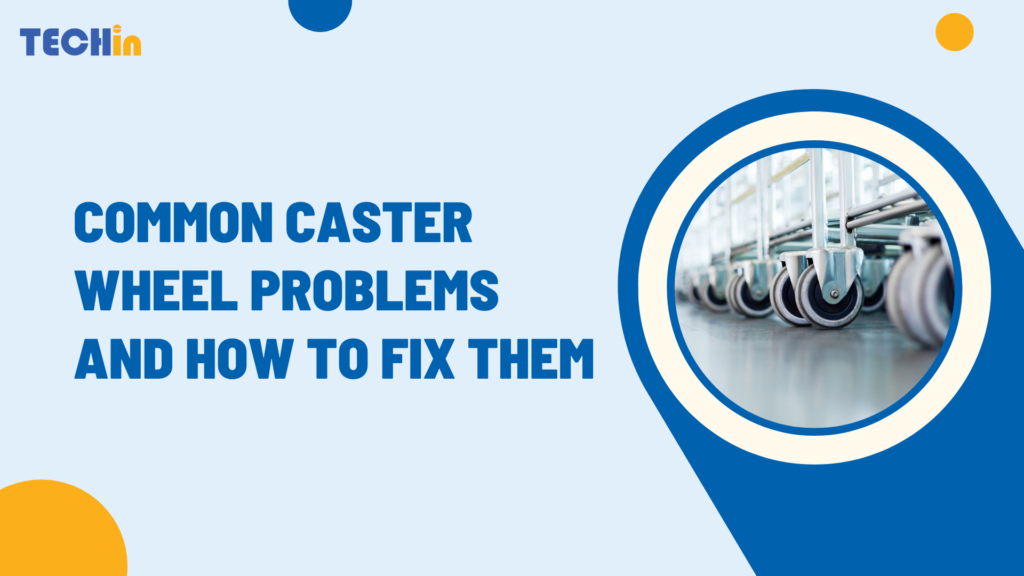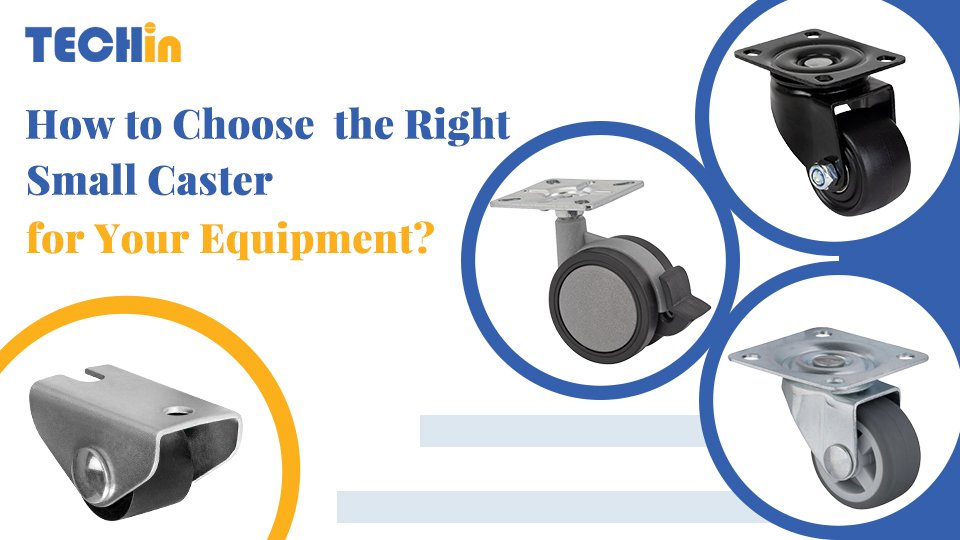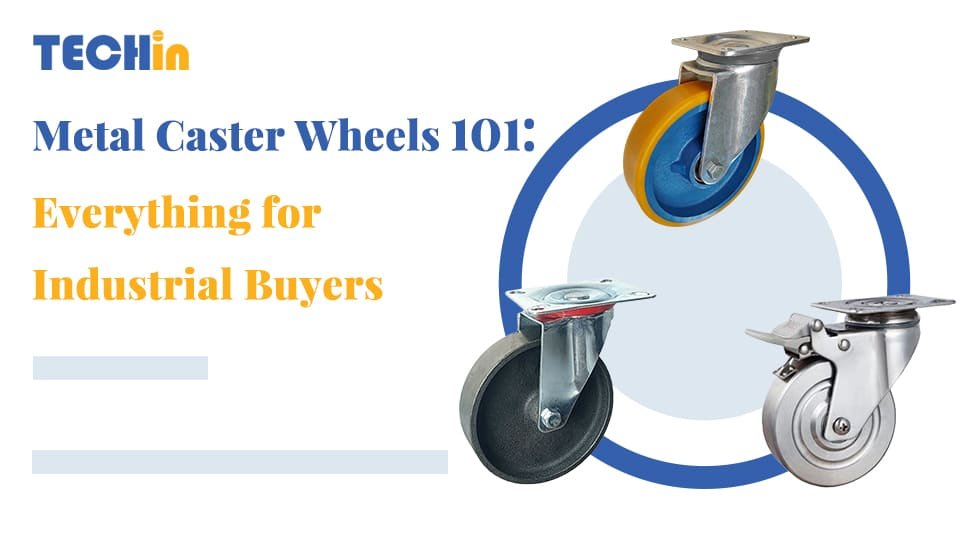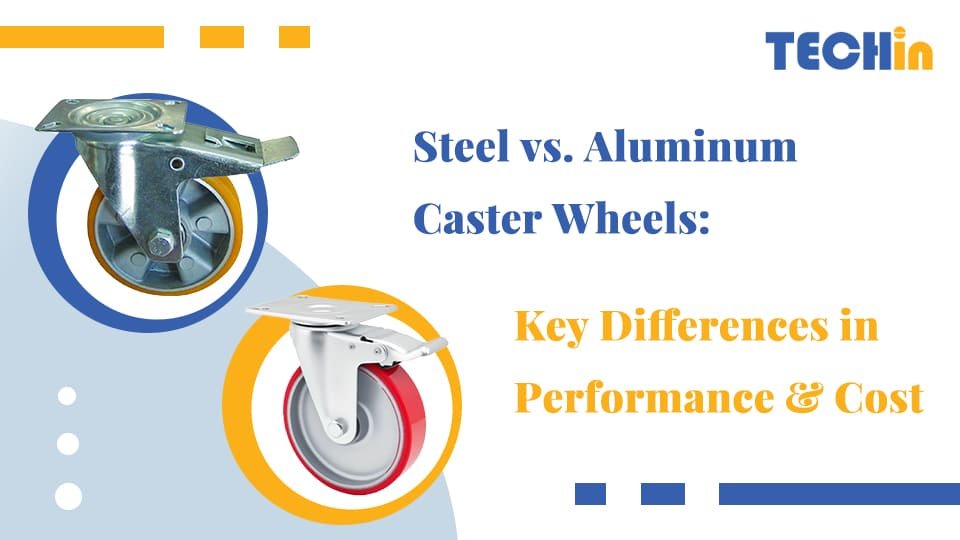Caster wheels are a big deal. They’re on everything from office chairs to heavy-duty industrial equipment. But over time, they can develop problems that make them not work right. And when they don’t work right, it’s frustrating. And when they don’t work right, it can cost you money. So, let’s talk about some common problems with caster wheels and how to fix them. That way, you don’t have to replace them all the time and you can keep things rolling smoothly.
Most of the problems you’ll have with caster wheels come from overloading them, not aligning them properly, environmental factors, and not taking care of them. If you clean them, lubricate them, and replace the parts that are bad, you’ll get a lot more life out of your caster wheels and you won’t have the problems that most people have.
Now, let’s talk about some specific problems you might have with your caster wheels and how to fix them.
How Do You Fix a Caster Wheel?
When a caster wheel stops rolling smoothly or becomes stuck, it’s usually due to dirt buildup or misalignment in the mechanism. Here’s how you can fix it:
- Loosen the axle bolt: If the wheel is not rotating properly, start by loosening the axle bolt that secures the wheel. This can help relieve any tension causing the issue.
- Realign the wheel: Check whether the wheel is aligned with the caster frame. If it’s misaligned, gently tap the wheel with a rubber mallet to bring it back into position.
- Clean out debris: Dirt and debris can block smooth movement. Use compressed air or a stiff brush to clean out the axle and wheel components.
- Replace the wheel: If cleaning and realignment don’t resolve the problem, consider replacing the wheel entirely, especially if it’s worn out or damaged beyond repair.
Can You Use WD-40 on Caster Wheels?
Yes, WD-40 or similar lubricants can be very useful for maintaining caster wheels. Here’s the best way to clean and lubricate your caster wheels:
- Clean the wheels: Use a damp cloth to wipe off surface dirt. If the wheels are heavily soiled, use a brush to scrub them clean.
- Apply lubricant: Spray WD-40 or a silicone-based lubricant onto the axle and swivel mechanism. Lubrication reduces friction and allows the wheel to rotate freely.
- Check for rust: If your casters are exposed to moisture, rust can build up over time. Lubricants like WD-40 help prevent rust, but if rust has already set in, consider replacing the affected parts.
How to Fix a Wobbly Caster
A wobbly caster can cause uneven movement and may damage the surface it’s rolling on. Here’s how to address the issue:
- Clean the wheel and axle: Dirt or debris might be causing the wheel to wobble. Remove the wheel and clean both the axle and the wheel surface thoroughly.
- Tighten the axle bolt: If the wheel continues to wobble after cleaning, check the axle bolt. It might be loose, causing the wheel to shift during movement. Tighten the bolt securely.
- Lubricate the swivel mechanism: Apply a penetrating oil or silicone spray to the swivel mechanism to ensure the caster turns smoothly.
- Replace damaged parts: If the wheel still wobbles after these steps, inspect for cracks or wear. Damaged wheels should be replaced to avoid further complications.
How Do I Stop My Caster Wheels from Rolling?
There are times when you need caster wheels to stay in place, whether it’s for safety reasons or to prevent unwanted movement. Here are a few ways to stop them from rolling:
- Install wheel locks: Many casters come with built-in locking mechanisms. If your casters don’t have locks, consider upgrading to locking casters, which can be engaged to hold the wheels in place.
- Use caster blocks or wedges: Placing blocks or wedges under the wheels provides a simple and cost-effective solution to stop them from moving.
- Apply wheel chocks: Wheel chocks are physical barriers you can place in front of or behind caster wheels to prevent them from rolling.
What Causes Caster Wheels to Wear Unevenly?
Uneven wear is one of the most common problems with caster wheels. The main causes are overloading, poor-quality materials, and imbalanced loads. Here’s how these factors contribute to uneven wear:
- Overloading: Every caster wheel has a specific weight limit. When you exceed this capacity, it puts excess pressure on certain areas of the wheel, causing them to wear out faster. To avoid this, always ensure that you’re using wheels designed for the weight of your load.
- Imbalanced loads: If the load is not evenly distributed across all caster wheels, one or more wheels may carry more weight than others, leading to uneven wear. Regularly check the balance of your equipment and distribute weight evenly.
- Low-quality materials: Casters made from inferior materials, like low-grade plastic, will wear out faster. Investing in high-quality, durable caster wheels made of rubber or polyurethane can help prevent uneven wear.
How to Fix Uneven Wear
- Replace worn caster wheels with high-capacity or more durable versions.
- Ensure even load distribution by regularly checking and adjusting the placement of items on the casters.
How Do I Fix Caster Wheels That Won’t Swivel?
When caster wheels refuse to swivel, it usually points to dirt buildup or a malfunctioning swivel mechanism. Here’s how to address the problem:
- Clean the swivel joint: Dust and dirt can accumulate in the swivel mechanism, making it hard for the wheel to rotate. Clean out the joint with a brush or compressed air.
- Lubricate the swivel mechanism: Apply a silicone spray or another lubricant to the swivel joint to ensure smooth rotation.
- Replace worn bearings: If the caster still doesn’t swivel after cleaning and lubrication, the bearings inside the swivel joint may be worn. In this case, replacing the bearings or the entire caster may be necessary.
How Do I Maintain Caster Wheels for Longevity?
Proper maintenance is key to ensuring your caster wheels last as long as possible. Here’s a checklist to help you keep them in good condition:
- Clean regularly: Dust, dirt, and debris can clog the wheels and affect their performance. Wipe them down frequently to keep them free of grime.
- Lubricate often: Regularly apply lubricant to both the axle and swivel mechanism to prevent friction and ensure smooth rolling.
- Inspect for damage: Check the wheels for cracks, thinning treads, or rust. Address these issues early by replacing damaged parts to avoid bigger problems down the road.
- Tighten bolts: Periodically check the axle bolts and screws for tightness. Loose bolts can cause wobbling or misalignment, leading to uneven wear.
- Avoid overloading: Never exceed the maximum weight limit of the caster wheels to avoid damaging them prematurely.
What to Do If Caster Wheels Cause Floor Damage?
If caster wheels are leaving marks or damaging your floors, it’s time to make some adjustments. Here’s what you can do:
- Switch to floor-safe wheels: Hard plastic or metal wheels are more likely to damage floors. Switching to rubber or polyurethane wheels can reduce the risk of scratches and dents.
- Use protective floor mats: Place mats under furniture or equipment with caster wheels to protect sensitive floors, such as hardwood or tile, from damage.
- Clean regularly: Dirt or small debris stuck in the wheels can scratch floors as the casters roll over them. Cleaning the wheels often can prevent this.
- Replace damaged wheels: Wheels with flat spots or cracks can cause more damage by dragging instead of rolling. Replacing damaged wheels with softer ones will minimize floor damage.
Conclusion
If you clean them, lubricate them, and inspect them regularly, you can prevent most of the problems you’ll have with your caster wheels. Whether you’re dealing with uneven wear, wheels that won’t roll, or damage to your floors, these simple fixes and preventive measures will keep your caster wheels rolling smoothly longer, saving you time and money.










